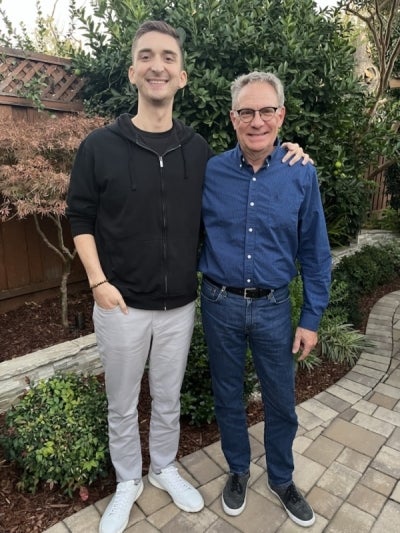Man Helps Former Neighbor Receive Kidney Donation via Paired Exchange
April 30, 2025It had been more than 20 years since Michael Torti had seen his friends and neighbors after they moved from Elmhurst to California with their then two-year-old son, Jacob Fill. Through a social media post, Torti learned that Fill, now 27 years old, needed a kidney. Torti generously stepped forward to become the catalyst in a chain of donations that allowed Fill to receive his life-saving transplant via compatible-pair exchange.
Fill was diagnosed with polycystic kidney disease (PKD) in grade school, but more serious complications didn't occur until 20 years later. In the fall of 2023, Fill experienced a ruptured cyst, something that he had become accustomed to as a PKD patient; however, this time the bleeding in his kidney persisted. After several attempts to stop it, the decision was made to remove the kidney entirely. Two months later, the same problem required Fill’s second kidney to be removed.
“At that point, I had been in and out of the hospital for months, received multiple surgeries, and had zero kidneys,” said Fill. “In order to live, I started dialysis treatment and was looking at a 6+ year wait for a transplant in California. For me, there didn’t seem to be an end in sight.”
After 10 months on dialysis, Fill learned he would be receiving a kidney from an unlikely source.
Though they haven't shared a zip code in more than 20 years, Torti stayed in contact with Fill’s parents, his former neighbors. He was moved when he learned about Fill’s condition from a Facebook post. "When I heard the story, all I could think about was my own daughter, who is Jacob's age," said Torti. "I couldn't imagine her having to go through something like this. I could only imagine the fear, sorrow and helplessness his parents must have felt."
Torti decided to undergo testing to become a donor for Fill, who had a complex situation due to his high level of antibodies from multiple blood transfusions. Torti later learned that he was the only compatible match for Fill. However, because of their 34-year age difference, transplant coordinators at Stanford Hospital sought a younger donor for Fill. Rather than donate his kidney directly to Fill, Torti helped Fill receive a new kidney by participating in a paired exchange. In a paired exchange, if a donor isn’t the best match for the intended recipient, they can opt to donate to another person on the waitlist.

"I realize that many people have some idealized or romanticized notion of their kidney living inside their child, sibling, best friend, or loved one, but that didn't matter to me," said Torti. "I was instantly open to the idea. Not only could it help Jacob, but in effect, I would be helping someone else in the process."
After agreeing to the paired donation, Torti called his former neighbors to catch up and to tell them that he would be donating a kidney to help Fill.
“The average person is on dialysis for several years, so that’s the path I thought I was on,” said Fill. “I had a really hard time allowing myself to believe that someone had come forward to donate for me. It was a really emotional time for my family and me. Getting that call from Mike gave me a sense of hope and allowed me to see the dialysis finish line.”
"There are many ways for kidney donations to occur,” said Veronica DiCianni, RN, Loyola living donor transplant coordinator. “At Loyola, we ensure that our patients are getting the best possible match, which may not be their loved ones who are willing to donate. A paired exchange allows you to donate a kidney on behalf of a loved one. Although you do not donate directly to them, the exchange facilitates their receiving a living donor kidney that is better suited to their needs in terms of age, size, and compatibility for the best possible outcome."
After a few months, a younger donor was found for Fill. Nearly one year to the day of Fill’s first kidney removal, multiple life-saving surgeries were performed, thanks to Torti’s generosity. On October 9, 2024, Fill received a kidney from a non-directed donor in Wisconsin, while Torti’s kidney was flown to save a different patient in Utah.
Three weeks after their transplant surgeries, Torti traveled to California to visit Fill and his family. "His family treats me as if I'm his donor, and they're very grateful for my gift," said Torti. "I appreciate their gratitude, but to me, this just felt like the right thing to do."
"We always hear about people hoping they're a match for their friend or loved one, but when you think about it, that isn't really the goal," said Torti. "The goal is to get them the best kidney with the best possible match, and to get it in months, not years. Whether it's a paired exchange or one of the various voucher programs, all it takes is the willingness to donate."
Fill is now back at work and back to living the healthy life he enjoyed before his health complications began. “Going through such a major life in my twenties change at only 25 was difficult, physically, mentally, and emotionally,” said Fill, “I felt like many of the parts of my life I cherished were being taken away. After fully recovering from the transplant, the donation, I feel like I have my full freedom back and I’m eternally so grateful to Mike, the medical professionals, and everyone involved in the pair exchange process.”
